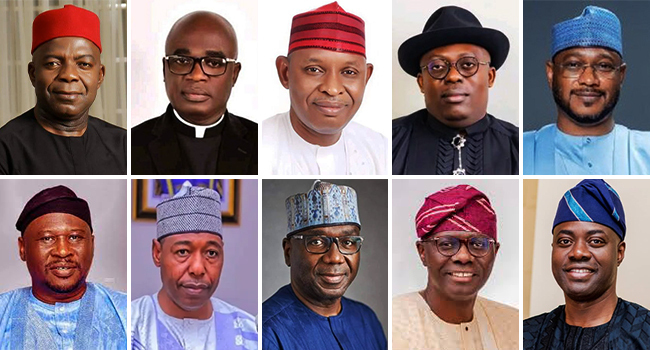Headline
30 Govs Spent N968.64bn On Refreshments, Others In Three Months – Report

No fewer than 30 state governments of the federation spent N986.64bn on recurrent expenditures, including refreshments, sitting allowances, travelling, utilities, etc., in the first three months of 2024, according to The PUNCH.
The states’ budget implementation reports, which were obtained from Open Nigerian States, a website supported by BudgIT that acts as a repository for public budget data, were analysed.
For the first three quarters of the year, our correspondent examined budget implementation data from thirty states; data for six states was not available.
Benue, Imo, Niger, Rivers, Sokoto and Yobe States were the ones without Q 1, 2024 data.
A breakdown showed that the 30-state government spent N5.1bn on refreshments for guests, N4.67bn on sitting allowances to government officials, N34.63bn on local and foreign travel expenses, and N5.64bn on utility bills, amounting to N50.02bn in the first three months of 2024.
The general utilities include electricity, internet, telephone charges, water rates, and sewerage charges, among others.
The sub-nationals also paid N405.77bn as salaries to their workers.
READ ALSO: Russian President, Vladimir Putin Now Wears ‘Bulletproof Vests’ Amid Assassination Fears
Other recurrent spending items covered in the report included the amount spent on foreign and domestic travel, Internet access fees, entertainment, foodstuff, honorarium/sitting allowance, wardrobe allowances, telephone bills, electricity charges, stationery, anniversaries/special days, welfare, aircraft maintenance, and more.
In the first three months of 2024, Abia State spent N10.92bn on its recurrent expenditures, including N165.38m on refreshments and feeding, N39.26m on utilities, N214.57m on sitting allowances, N127.1m on local and foreign travels, among miscellaneous expenses.
During this period, Adamawa State expended N23.7bn on recurrent expenditures with N287.61m spent on refreshments and feeding, N109.62m on utilities, N79.57m on sitting allowances, N768.77m on local and foreign travels.
For Akwa Ibom State, recurrent expenditure gulped N46.85bn, which included N4.46m on refreshments and feeding, N223.32m on utilities, N6m on sitting allowances, N214.61m on local and foreign travel.
Anambra State disbursed N9.91bn for recurring expenses with N78.18m on refreshments and feeding, N32.52m on utilities, N42.09m on sitting allowances, N188.39m on local and foreign travel.
Also, recurrent expenditures cost Bauchi State Government N35.75bn with N397.58m going to utilities, N50.8m on refreshments, N287.11m on allowances, and N413.56m on trips.
Bayelsa State spent N35.1bn on recurrent expenditures, comprising N28.4m on utilities, N156.14m on refreshments and N279.99m on trips.
READ ALSO: Fight-to-finish: No End To Gaza War Until Hamas Total Elimination, Israel PM Insists
Similarly, Lagos State disbursed N189.62bn for recurrent expenditures, including N1.21m for refreshments, N383.12m for utilities, sitting allowances costing N52.79m and N633.37m on travels.
Borno spent N18.79bn, Cross Rivers (N17.44bn), Delta (N68.68bn), Ebonyi (N14.95bn), Edo (N32.32bn), Ekiti (N32.8bn), Enugu (N7.51bn) and Gombe with N20.89bn.
Within the same period, Jigawa State spent N15.52bn on the recurrent expenditures, Kaduna expended N34.69bn, Kano (N34.41bn), Katsina (N21.87bn), Kebbi (N11.67bn), Kogi (N37.4bn), Kwara (N24.34bn), Nasarawa (N18.61bn), Ogun (N47.12bn), Ondo (N31.12bn), Osun (N24.39bn), Oyo (N40.12bn), Plateau (N24.70bn), Zamfara (N13.46bn), and Taraba (N20.93bn).
Government spending has come under increased scrutiny in recent times, particularly in light of the country’s worsening economic challenges.
At different fora, financial experts have also raised concerns about states’ spending on recurrent expenditure, highlighting the need to embrace financial innovations.
A development economist, Aliyu Ilias, said many states had yet to fully develop themselves as industrialised and marketable to attract investors.
READ ALSO: Woman Allegedly Kills Husband With Pestle Over Side ‘Chick’ In Ondo
Ilias urged governors to develop an area of strength they could leverage to attract foreign investments.
He said, “Going forward, what they could do is identify one area of strength. For instance, Bayelsa has oil and should be able to attract investments. I think it is about policy. They should give the policy a chance that would allow people to come and invest. They should also create an attraction and develop an economic summit that will make sure they showcase and attract investors.”
An economist and former Vice-Chancellor of the University of Uyo, Prof. Akpan Ekpo, urged the states to increase their revenue by improving service delivery.
On his part, a Professor of Economics at Babcock University, Segun Ajibola, stated that the enduring problem of high governance expenses had persisted at the state level, with inadequate oversight and accountability resulting in minimal economic benefits for grassroots citizens.
READ ALSO: Pilot Dies After Planes Collide At Portugal Air Show
The former president of the Chartered Institute of Bankers lamented that state assemblies had also abandoned their oversight duties, leaving the state governors to operate with no iota of transparency and accountability.
He said, “The first issue is the perennial complaint about the high cost of governance in Nigeria and at all levels. When you look at these issues, attention is often concentrated on the Federal Government, so the searchlight is always more on the central government. Most often, nobody cares about what is happening in the states and local government, and that is where the problem is.
“There are so many institutional frameworks in place to look at what is happening at the federal level but who cares about the states? The cost of governance in relative terms is even much higher in states than the federal and that is why you hardly feel the impact of governance in most states.
“Only a few states can boost a significant presence in the lives of their people in our states. The state assemblies are expected to conduct oversight functions on the activities of the executives in their respective states, but in reality, how many states are doing that, leaving the executives to be all in all in incurring high costs.”
PUNCH
Headline
Coup: Guinea-Bissau Junta Releases Six Held Opposition Politicians

Guinea-Bissau’s ruling junta on Tuesday released six members of the political opposition who had been detained since a coup last month.
The six freed opposition members are said to be close associates of Domingos Simoes Pereira, head of the PAIGC party that led the country to independence in 1974.
Pereira has been in custody since the coup.
In a statement by the High Military Command, the junta’s governing body, the releases are described as a sign of good faith and a step towards the return to constitutional normality and respect for international rights.
READ ALSO:Why West African Troops Overturned Benin’s Coup But Watched Others Pass
The army seized power on 26 November after ousting outgoing President Umaro Sissoco Embalo in the wake of a presidential vote.
After taking over, the military suspended the electoral process and announced it would take control of the West African country for a period of one year.
Recall that another opposition candidate, Fernando Dias, took refuge in Nigeria’s embassy, which granted him asylum, while Embalo fled the country after being briefly detained by the military at the time of the coup.
Meanwhile, Senegal’s Foreign Minister, Cheikh Niang, led a delegation to Guinea-Bissau, where he met with detained opponents and requested their release.
Headline
7 Territories Still Under Colonial Rule

Even though most nations became independent in the last century, some territories are still ruled by other nations.
Contents
1. Western Sahara
2. Guam
3. American Samoa
4. United States Virgin Islands
5. Falkland Islands / Malvinas
6. Gibraltar
7. Bermuda
Many of them remain on the United Nations list of non-self-governing territories, meaning they have not completed the process of decolonization. These places usually depend on bigger countries for laws, passports, defence, or political control.
In this article, Nigerian Tribune highlights 7 territories still under colonial rule:
READ ALSO:Nigeria Ranks World’s 102nd Happiest Nation, US, Germany Not Among 20 Top Counties
1. Western Sahara
Western Sahara remains one of the world’s biggest unresolved colonial issues. Morocco controls most of the territory, but the Polisario Front wants independence for the Sahrawi people. The UN is still trying to help both sides agree on a peaceful solution.
2. Guam
Guam is an important US territory in the Pacific, used heavily for American military operations. The US oversees its defence and foreign relations.
People living there are US citizens, but they cannot vote in presidential elections and do not have full representation in Congress.
READ ALSO:FULL LIST: US To Review Green Cards From 19 ‘Countries Of Concern’ After Washington Shooting
3. American Samoa
American Samoa has more local control than Guam, but the United States still decides immigration, defence, and foreign affairs.
Residents are considered US nationals and must apply if they want full citizenship.
4. United States Virgin Islands
The US Virgin Islands have their own legislature, but the United States makes major constitutional and political decisions. The territory depends heavily on US federal support.
5. Falkland Islands / Malvinas
The Falkland Islands remain controlled by the United Kingdom (UK), but Argentina has long disputed this claim, having been in control of the Islands for a few years before 1833.
The people living there voted strongly to stay British, yet the sovereignty dispute continues to appear in the UN.
READ ALSO:Six Countries With Highest Number Of Billionaires In 2025
6. Gibraltar
Gibraltar sits at the Southern tip of Spain. The United Kingdom controls it, but Spain insists the territory belongs to them.
Gibraltarians have repeatedly voted in favour of remaining British, but the dispute is still discussed within the UN Decolonisation Committee.
7. Bermuda
Bermuda is a British Overseas Territory situated in the North Atlantic Ocean. Although it manages most of its own internal affairs and enjoys a strong economy with modern facilities, the United Kingdom still handles its defence and represents it in global matters.
Headline
Russia-Ukraine War: Pope Leo Calls For Global Christmas Truce

Pope Leo XIV on Tuesday renewed his call for a global truce on Christmas Day, saying he felt “great sadness” after Russia “apparently rejected a request” for a pause in fighting.
Speaking to reporters at his residence in Castel Gandolfo near Rome, the Pope urged all sides involved in conflict to observe at least one day of peace.
“I am renewing my request to all people of goodwill to respect a day of peace — at least on the feast of the birth of our Saviour,” Leo said.
Recall that Russia invaded Ukraine in February 2022 and has repeatedly turned down calls for a ceasefire, arguing that any pause would give Ukraine a military advantage.
READ ALSO:Russian Strikes Kill Five In Ukraine, Cause Power Outages
“Among the things that cause me great sadness is the fact that Russia has apparently rejected a request for a truce,” the pope said.
Referring to conflicts worldwide, Leo added, “I hope they will listen and there will be 24 hours of peace in the whole world.”
The appeal came as fighting continued in eastern Ukraine. On Tuesday, Ukrainian forces withdrew from a town after heavy battles with Russian troops. Russian strikes killed three civilians and left thousands without power during winter temperatures.
READ ALSO:Trump Blasts Ukraine For ‘Zero Gratitude’ Amid Talks To Halt War
There was no indication of progress toward ending the war after separate meetings last weekend in Miami between the United States officials and negotiators from Russia and Ukraine. The conflict is nearing four years with no settlement in sight.
Earlier this month, Pope Leo met Ukrainian President Volodymyr Zelensky. When asked whether he would accept Zelensky’s invitation to visit Ukraine, the pope said, “I hope so,” while noting that it was not possible to say when such a visit could happen.
Leo also warned that efforts to secure peace without European diplomatic involvement were “unrealistic”, expressing optimism that President Donald Trump’s proposed peace plan could bring a “huge change” to the transatlantic alliance.

 News3 days ago
News3 days agoPHOTOS: New Era In Furupagha-Ebijaw As Okpururu 1 Receives Staff Of Office

 Metro5 days ago
Metro5 days agoJUST IN: Former Edo Information Commissioner Is Dead

 News2 days ago
News2 days agoUBTH CMD Marks 120 Days In Office, Expresses Commitment To Providing Conducive Working Environment

 News3 days ago
News3 days agoFG Declares Public Holidays For Christmas, New Year Celebrations

 News3 days ago
News3 days agoOPINION: Gumi And His Terrorists

 Metro5 days ago
Metro5 days agoShe Grabs, Pulls My Manhood Anytime We Fight — Husband

 News2 days ago
News2 days agoFIRS Confirms NIN As Tax ID

 Metro5 days ago
Metro5 days agoWhy I Charged My Husband Money For Sex —Woman

 News5 days ago
News5 days agoMy Wife Dented My Image, Took Our Marital Crises To Radio Stations — Husband

 News3 days ago
News3 days agoOPINION: Christmas And A Motherless Child






























